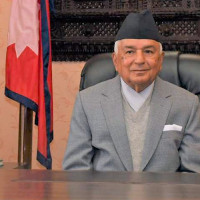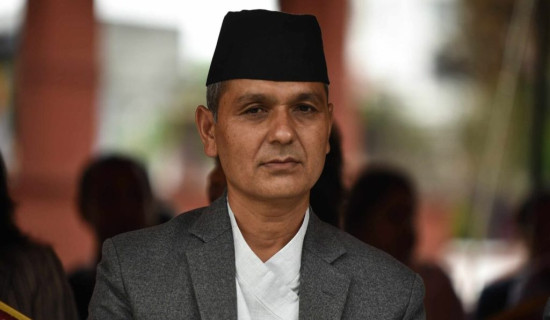- Thursday, 19 February 2026
Stop Discrediting Gen Z Youths
What comes to your mind when you hear the term 'Gen Z group '? If you ask me the same question, I would answer that it is a particular generation of people who belong to the age group 13 to 28. They are globally connected via the internet, so they are pretty aware of the worldly affairs and they are eager to question if they find something is going wrong or they need further explanation on certain issues. Sadly, some notorious political leaders accuse the Gen Z people of being terrorists, traitors or they even compare them with YCL (Young Communist League) people. Are Gen Z and YCL people the same? In my opinion, they are like chalk and cheese.
The Young Communist League was born during a decade-long Maoist movement in Nepal, which dated back to 1996 and continued until 2006. Since the Maoist movement was an armed struggle, YCL was also obviously an armed youth force to support this movement. The people of my generation have experienced the terror of Maoists at that time. Do the youths of Gen Z hold the same terror? Are they calling for a civil war like YCL? Are they carrying arms? If not, then how dare those politicians address the young Gen Z people as terrorists or YCL?
Economic background
Thanks to Aashika Tamang, a popular social activist, who, through her videos, has taken us to the places of Gen Z protesters who were injured during the protest of September 8 and 9. Tamang has shown us the real Gen Z faces. Most of the injured people seem to be college students from different villages and they have rented rooms in Kathmandu. They do not seem to be the children from well-to-do families. Through the condition of their rooms, it is clearly visible that their parents are struggling enough to support their children's education.
Whether Aashika Tamang has met the Gen Zers in their rooms or at the hospital beds, all of them look innocent, friendly and determined to bring positive changes in the country. None of them has said that they are in favour of violence. In an unequivocal voice, they simply ask for justice. I have also heard many Gen Z representatives and all of them are presenting their agenda clearly. None of them wants to instigate the violence again. They have seen a lot of loss and destruction in two days, i.e., on the 8th and 9th of September. So, they are begging for no more damage on the part of people and properties. It also does not mean that the Gen Z group is the only group that participated in the protest. There are thousands of others out there who belong to this group. Are they all terrorists?
The Gen Z protest in Nepal attracted an international audience as well. A number of international media outlets have covered the news positively. One of the Indian news channels had made a headline, 'Jis or jawani chalti hai or jamana chalta hai' or the youth leads the world. Nobody can deny that the protest was initiated with a pure intention but it is another story that it was contaminated by various anarchical elements in between. I have seen many school children in foreign countries marching on the streets with placards in support of the Gen Z protesters in Nepal.
Not only this, in countries like India, Peru, Kenya, Indonesia, the Philippines, Morocco and Madagascar also youth-led protests have begun to show their dissatisfaction on different issues. A recent CNN report 'From Kathmandu to Lima,’ states that youth-led uprisings are driving thousands from their screens to the streets, demanding accountability, change and, in some cases, toppling governments.' In such a situation, how wise it is to blame the Gen Z group for every mishappening that can be observed recently in Nepal? When we go back to the Maoist movement, it never got international acceptance.
Even though there was a ceasefire and the Maoist party entered open politics and signed a peace treaty, it still had its terrorist tag. It took six solid years to get this tag lifted by the US government. So, there is no point in comparing Gen Z with YCL. As mentioned above, Gen Zers are globally connected. If something happens in a corner of the world, it spreads everywhere in no time. It is people's basic right to get access to the information they need without any censorship. The KP Oli-led government tried to confiscate this right and all Nepali people are facing its consequences.
Categorisation
Based on their birth, the world's people are roughly categorised into eight categories. They are the Greatest Generation (born between 1901 to 1927), the Silent Generation (born between 1928 to 1945), the Baby Boomers (born between 1946 to 1964), the Generation X (born between 1965 to 1980), the Millennials (born between 1981 to 1996), the Generation Z (born between 1997 to 2012), the Generation Alpha (born between 2013 to 2024) and the Generation Beta (born between 2025 to 2039).
According to their category, these people have their typical characteristics too. The available statistics show that the younger generations, such as Gen Alpha and Gen Z, are growing rapidly and they are becoming a larger portion of the global population, approximately 24 per cent and 23 per cent respectively. In this way, Gen Z represents the world population instead of being a small political group of a country like YCL. Therefore, dear people, do not defame them by labeling terrorists, traitors or YCL.
(The author is the director of Vidya Shilpa Academy, Damak, Jhapa.)
















